Spain: More pressure on food prices
Farmers' profit margins are on the rise, threatening further inflation. In its latest study, the Spanish Observatory of Business Margins reports that "margins on sales in the agri-food chain continued to recover in the third quarter of 2023, driven by the primary sector and the food industry". At the same time, although food inflation fell last December, it could rise again if the drought continues.
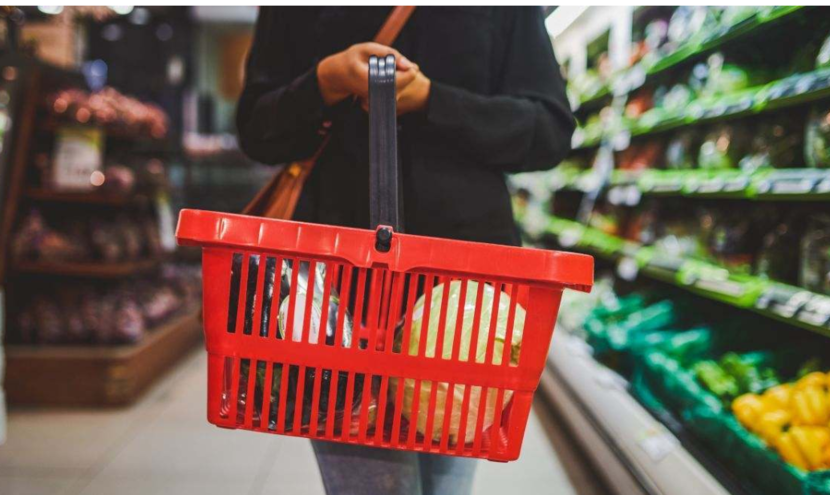
The Business Margin Observatory
The third quarter of 2023 saw a recovery in profit margins, with a return to pre-COVID crisis levels. Although the evolution remains "heterogeneous by sector", the margins of the agri-food chain stand out in this recovery, driven upwards by the primary sector and food companies. This situation contrasts with the fall in margins in the food distribution chains, which are reducing their profitability (Fig. 1).
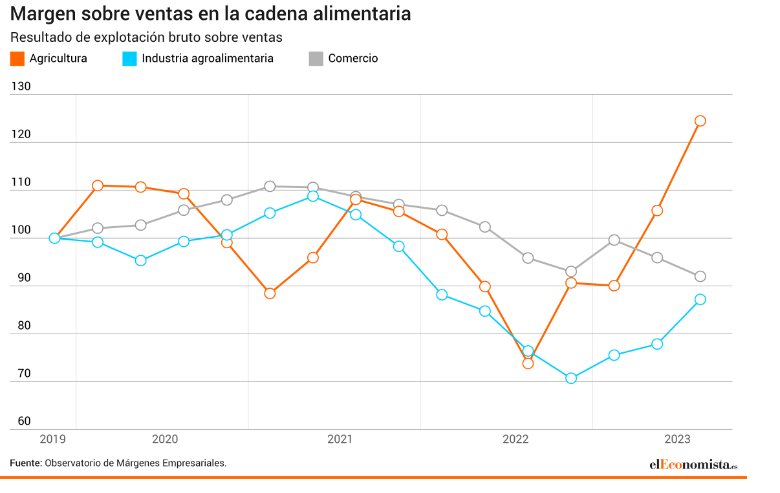
As reported by the Bank of Spain, between July and September last year, the evolution of energy prices and raw material costs meant that sales margins for the Spanish economy as a whole exceeded pre-pandemic levels. Agricultural margins were already above pre-pandemic levels and the food industry was recovering steadily. The exception was the food retailing. The supermarket sector has been in decline for two consecutive quarters. According to the report, "distribution has still not been able to reverse the contraction experienced during the energy crisis".
Higher farm-gate price due to drought
On the other hand, the farm-gate price increased by 11.4% in December 2023 (Fig. 2), more than four points higher than food inflation of 7.3% in the same month, and moving away from the double-digit levels it has been at for 19 months. Specifically, the downward trend in food prices, which have not been this low since March 2022, is due to lower vegetable prices and to the fact that the prices of milk, eggs, cheese, bread, cereals and meat rose less in December 2023 than they did in the same month in 2022.
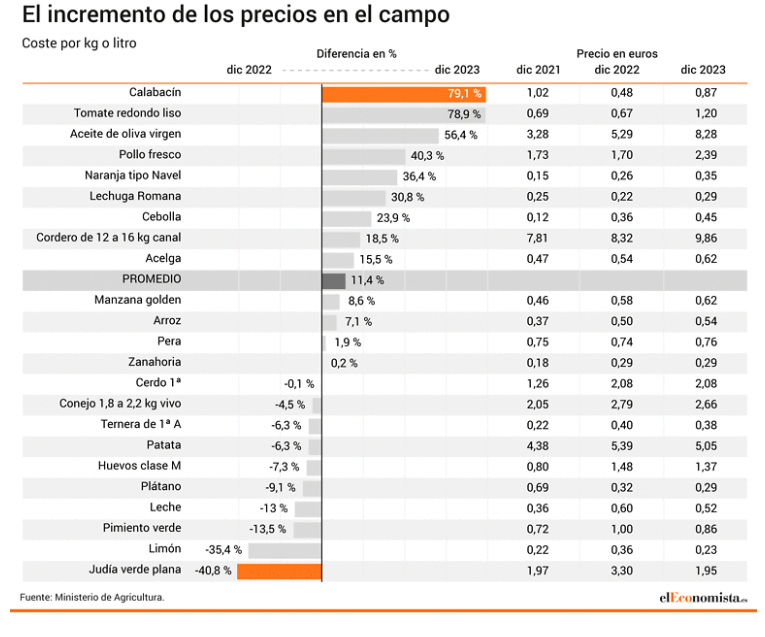
Farm-gate prices are rising because of the drought, but this is not preventing many farmers from suffering heavy losses due to an inability to cover costs. For a farmers' organisation, it will be impossible for prices to fall unless production costs fall.
Although there are also products where farm-gate prices are falling -green beans, for example, fell by 40.8% in the last year and lemons by 35.4% - the average double-digit price increase has been going on for more than two years and, unless the rains bring relief, the alarm is still at its highest. As a result, there are products that have seen much higher increases since 2021. Onions have risen by 280%, olive oil by 152% and oranges by 140%.
Farm-gate prices rose by more than 63% in February last year, forcing the government to approve an aid package to slow the escalation. Thanks in part to this aid, prices have slowed down but are still higher than supermarket price rises. Something similar is also happening in the food industry. However, the moderation of prices in the food industry and in the retail sector does not mean that stability is guaranteed, as the sector warns, especially in view of the current escalation of tensions in the Middle East.
Basic shopping basket is 19% more expensive one year after VAT cut
Just one year after the implementation of one of the star measures of the government's anti-inflation shield, the reduction of VAT on basic foodstuffs, it seems that it has not had the expected effect, at least in terms of household savings. The basic shopping basket is almost 20% more expensive that it was in January 2023 (Fig. 3), according to information compiled by the Association of Financial Users (Asufin).
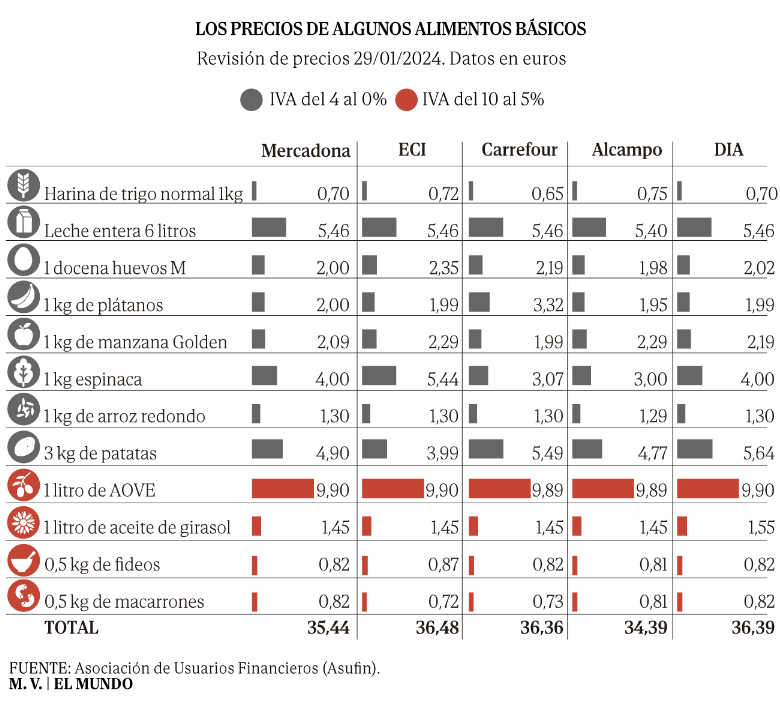
Despite the fact that staple foods have been taxed less for a year now, the government’s measure to cushion the impact of inflation on household budgets has been diluted by price escalation and is barely noticeable in consumers' wallets. However, it has had an impact on the public purse, with the tax authority losing more than €1.5 billion in VAT on food.
Farmers and retailers blame each other for rising prices
The battle between the countryside and distribution is reignited as farmers protest. Fearing that the protests already sweeping Spain could lead to supply problems, supermarket chains are warning that farmers are raising their prices above food inflation. Distribution points to the aid and subsidies farmers received last year and the fact that farm incomes are at record highs (see: Spain: what happened in 2023 and what we can expect in 2024 | Nieuwsbericht | Agroberichten Buitenland), as well as the findings of the latest Business Margins Observatory report mentioned above.
However farmers do not feel the same way. According to the organization COAG (Coordinadora Agricultores y Ganaderos), the increase in farm income in 2023 was only 5.5% in real terms, and compared to the average of the last five years, this increase is only 1.1%. It should also be borne in mind that farm income does not measure the disbursement of official wages, payments of interest on loans or rents.
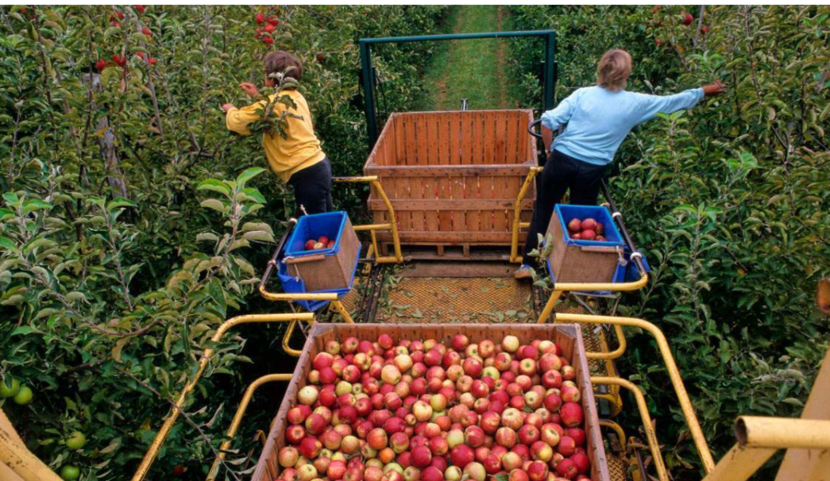
According to farmers’ organisations, the situation is far from prosperous. Drought and other adverse weather conditions have taken their toll on crops. In addition, "Brussels has taken its toll on the farmers, and the Spaniards tremble at every new measure taken by the Commission, the Parliament or the Council", one of the farmers ' leaders said.
The conflict with farmers is not the only one facing supermarkets. For months, they have been under pressure from the food industry to raise prices. Retailers refuse to raise prices, arguing that they are forced to resort to promotions and discounts to stem falling sales.
"Inflation hurts us all, we are not responsible for the rise in food prices," reailers insist. Until now, Spain has traditionally been a country where the chain has been united in the face of challenges. The fear now is that this unity could break down, with the primary sector, industry and distribution more at odds than ever, one expert says.
Labour adjustment
Major food manufacturers are adding up the job cuts affecting more than 1,400 workers in Spain over the last two years. This period has been marked by a deep inflationary crisis that has hit the food and drink industry in particular.
Giants such as Heineken, Pepsico, Nestlé, Nueva Pescanova and, in recent weeks, Danone and Bimbo have carried out collective redundancies, in some cases involving factory closures, citing production or organisational reasons. “Manufacturers have reduced volumes and need fewer staff, both in the factory and in the office”, union sources explain. “Factors such as cost increases, which have eaten into the profit margins of many companies in the sector, and a shift in demand towards private label and lower-priced products have all had an impact”.
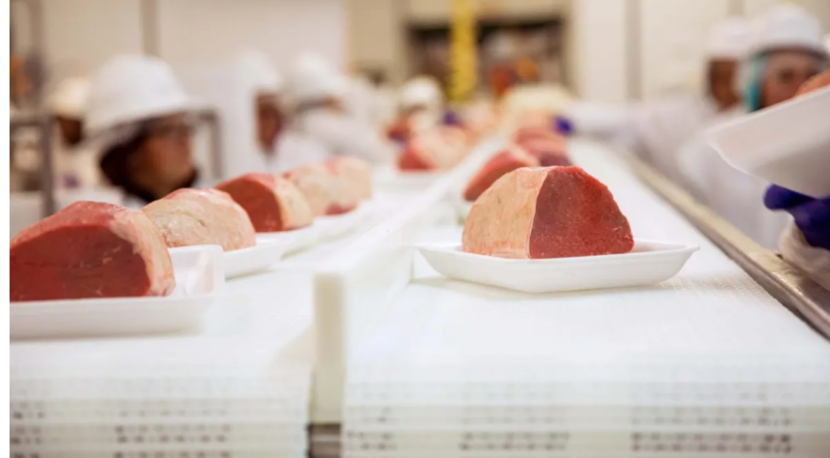
The Food and Drink Manufacturers' Association (Fiab) does not comment on the decisions of individual companies. But it acknowledges that "international uncertainty, a worrying drought and significant cost inflation" are leading to pressure on margins and a slowdown in industry growth. The association adds that production and exports are growing in value but not in volume, with the number of companies falling by almost 1,200 between 2018 and 2022.
Source: elEconomista /El Mundo/Cinco Días